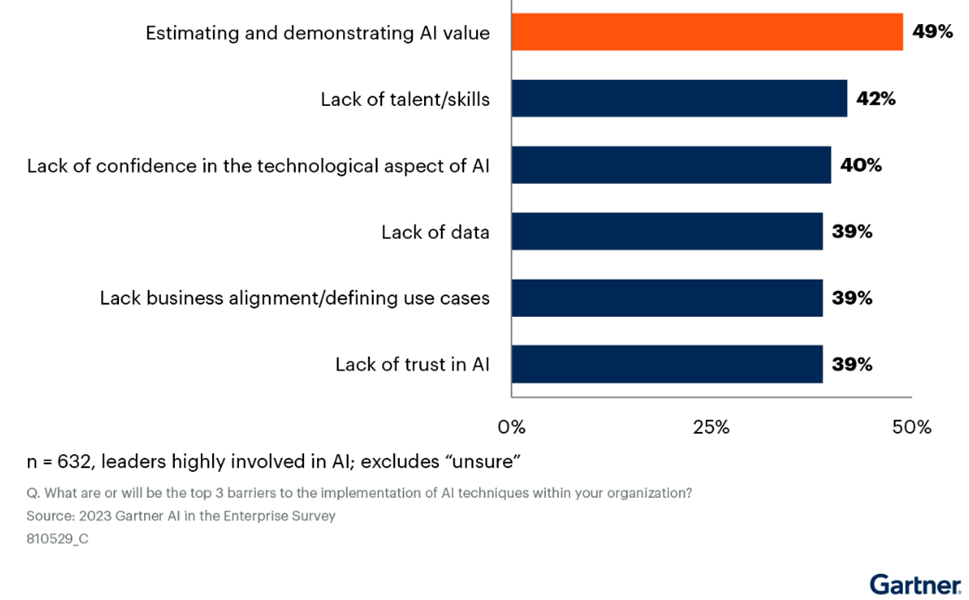Generative artificial intelligence (GenAI) is the number-one type of AI solution deployed in organisations, according to a new survey by Gartner, which also found that the primary obstacle to AI adoption – reported by 49% of survey participants – is the difficulty in estimating and demonstrating the value of AI projects.
► Demonstrating value a bigger barrier than skills shortages or trust
► Gen AI is most frequently deployed AI solution
The issue of demonstrating value surpasses other barriers such as talent shortages, technical difficulties, data-related problems, lack of business alignment and trust in AI. ‘Business value continues to be a challenge when it comes to AI’, said Leinar Ramos, senior director analyst at Gartner. ‘As organisations scale AI, they need to consider the total cost of ownership of their projects, as well as the wide spectrum of benefits beyond productivity improvement.’

GenAI is acting as a catalyst for the expansion of AI in the enterprise

Of the 644 respondents Gartner interviewed from organisations in the US, Germany and the UK in Q4 2023, 29% of the said they had already deployed and are using GenAI. This was the biggest form of AI being used – ahead of solutions like graph techniques, optimisation algorithms, rule-based systems, natural language processing and other types of machine learning.
The survey also found that utilizing GenAI embedded in existing applications (such as Microsoft’s Copilot for 365 or Adobe Firefly) is the top way to fulfil GenAI use cases, with 34% of respondents saying this is their primary method of using GenAI. This was found to be more common than other options such as customising GenAI models with prompt engineering (25%), training or fine-tuning bespoke GenAI models (21%), or using standalone GenAI tools, like ChatGPT or Gemini (19%).
‘GenAI is acting as a catalyst for the expansion of AI in the enterprise’, said Ramos, and ‘made topics like AI upskilling and AI governance much more important. He said that organisations struggling to understand business value can learn from those already applying the technology more widely. Gartner’s survey found 9% of organisations are currently ‘AI-mature’ and identified four foundational capabilities that they share:
- A scalable AI operating model, balancing centralised and distributed capabilities.
- A focus on AI engineering, designing a systematic way of building and deploying AI projects into production.
- An investment on upskilling and change management across the wider organization.
- A focus on trust, risk and security management (TRiSM) capabilities to mitigate the risks that come from AI implementations and drive better business outcomes.
Only 48% of AI projects make it into production
‘AI-mature organisations invest in foundational capabilities that will remain relevant regardless of what happens tomorrow in the world of AI, and that allows them to scale their AI deployments efficiently and safely,’ said Ramos.
Focusing on these foundational capabilities can help organisations mature and alleviate the current challenge of bringing AI projects to production. The survey found that, on average, only 48% of AI projects make it into production, and it takes eight months to go from AI prototype to production.
Gartner has produced a complimentary webinar called “What Mature Organizations Do Differently for AI Success.”
Top barriers to implementing AI techniques (sum of top 3 ranks)


